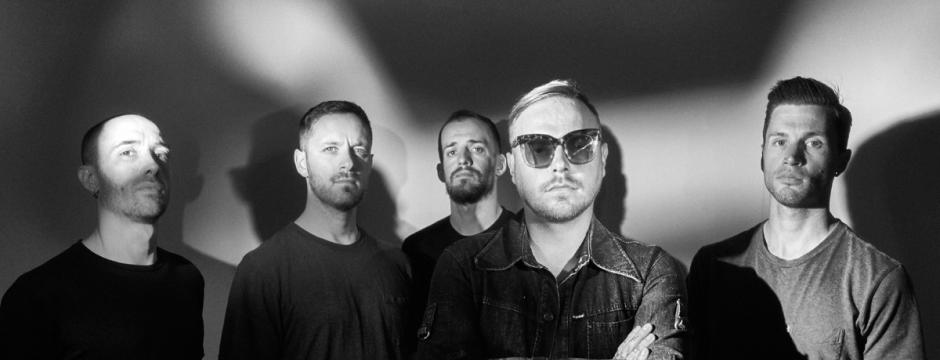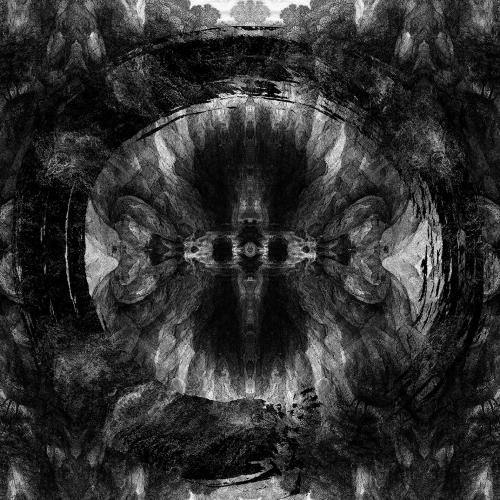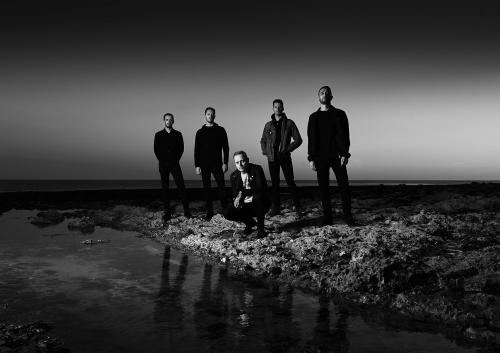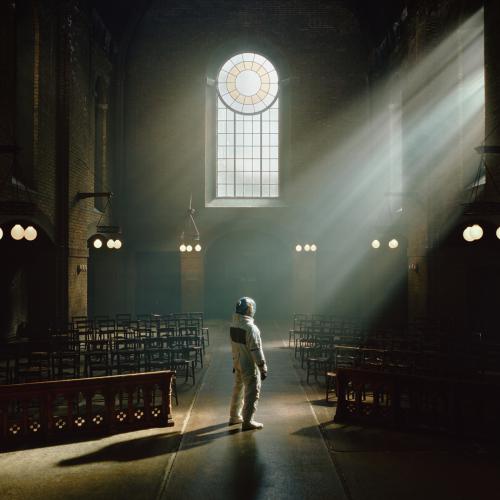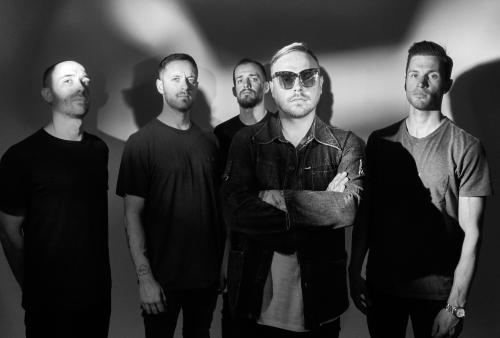Band: Architects
Album: For Those That Wish To Exist
VÖ: 26.02.2021
Label: Epitaph / Indigo
Website: www.architectsofficial.com
In November 2018, Architects stared grief in the face on the remarkable album Holy Hell: a stark picture of the darkness and despair that lay at the heart of losing a brother, band mate and best friend in Tom Searle, the group’s founding guitarist who two years prior passed away following a private three-year battle with cancer.
The album, which bravely laid bare the band’s emotions with a vulnerability that few would ever publicly open themselves up to, forged such a deep connection with fans new and old as to see the quintet – vocalist Sam Carter, drummer Dan Searle, bassist Ali Dean and guitarists Josh Middleton and Adam Christianson – headline arenas the world over, and move in excess of 200,000 equivalent album units. This was the band finding a voice for their, and their fans’, innermost pain, and in turn cementing their place as one of rock music’s most critically revered and commercially successful talents.
Two years removed from that journey, though with its lessons and spirit embedded in the fabric of their being, Architects have applied that same soul-searching introspection to their highly-anticipated new opus, For Those That Wish To Exist. An examination of the part we are all playing in the world’s slow destruction, the band’s ninth studio record tackles the biggest questions facing the future of our planet with their grandest, most ambitious work to date.
“This album was me looking at our inability to change to a way of life that would sustain the human race and save the planet,” summarises principal songwriter Dan Searle. “The human race has become out of control; the world is dying and it is all our fault. It’s a manifestation of our collective behaviour that is running rampant, and at this moment desperately needs to be altered.”
Such concerns have long been prevalent in the music of a band who have continually championed and shared their platform with causes such as Sea Shepherd, are outspoken critics of barbaric exercises such as fox hunting, and who have fixed a focus on sustainability in everything from their travelling tour scheduling to the recently launched Architects Merch Co..
It is through such a position of personal accountability that the universal themes of For Those That With To Exist are uniquely approached.
“In writing the record, I felt a great accountability for our own actions, and the part we are playing as individuals,” Dan begins. “I wanted to look in the mirror and ask ourselves the question of what are <we> going to do, as opposed to trying to point the finger at politicians. Change has to start on a personal level. The world has developed a culture of wanting someone else to deal with it, when we need to take our own responsibility. It has to start there.”
Disdain for such communal apathy is writ large across For Those That Wish To Exist’s 15 tracks. ‘When the clock runs down to zero / We’ll all stand up and take a bow / So quick to play the hero’ bemoans the song An Ordinary Extinction; ‘We can say how we all wanna be saved / But it’s easier to follow’ spits Carter elsewhere on Little Wonder. Album opener “Do You Dream Of Armageddon?” confronts that reality with a simple question: ‘Will we ever learn our lesson?’
It is one of many presented without answer throughout the record’s hour-long journey of self-examination. These songs hang in a limbo between energising positivity that it is not too late to correct our collective course, and a paralysing negativity of defeatism; where hope and despondency are bed-fellows triggered daily by the simple act of existence. Neither wins out; come the swelling grandeur of album-closer “Dying Is Absolutely Safe”, listeners may feel anything from a crushing weight of hopelessness to an uplifting sense of newfound determination. When the world today so often leaves you feeling numb, Carter admits he is “so proud that we can stir such conflicting emotions.” Such a reflection of the human condition, and the exhausting highs and lows that come it is perhaps For Those That Wish To Exist’s purest, and most absorbing, achievement.
“The album is its own beast,” Carter reflects. “It’s a piece of art that is there to allow people to take what they want from it. It’s a big question mark. There’s some big questions being asked in it, and I think the answer to each is different depending on your own circumstances. Sometimes you feel reasons to be positive. Sometimes you don’t. It reflects how we all feel in life, from day to day.”
Written across the past 24 months – shaped by experiences both professional and personal, including Searle’s changing outlook as a new father – and recorded at a multitude of locations throughout 2020 (including at Devon’s Middle Farm Studios and at home in the band’s birthplace of Brighton), For Those That Wish To Exist sees Architects channel such bigger-picture thinking into their most expansive sonic offering yet, which builds upon the band’s hallmark post-metalcore and layers a burgeoning influence of electronics and orchestral strings, horns and choirs. Guest spots from Parkway Drive’s Winston McCall, Royal Blood’s Mike Kerr and Biffy Clyro frontman Simon Neil punctuate proceedings, bringing their own changes of pace and “unique tones”, as Carter – whose own vocal performance, shaped by an “unhealthy” drive for perfection, moves into dynamic new territory – puts it. The result is a rich tapestry that transcends the limitations of genre and rewards exploration and immersion in its journey.
To what destination said journey leads is uncharted. Creatively, it means that Architects remain not only countless steps ahead of their peers, but in an entirely different lane of their own making altogether. Thematically, both Carter and Searle return to the album’s title as evidence that evolution, of challenging established models and striving for a collective betterment, is something we all must rise to.
“For me, the album title is speaking to the people who are ready to drag themselves through the shit, and help drag other people through it too, in order to fight the good fight,” Carter says.
“The title speaks to those people who want to live, who want to live in a better world, who want to make a difference,” asserts Searle. “For anyone who thinks that creating a world that we can live in, and that our children can live in and our children’s children can live in, for anyone who thinks that’s important, this is for you.”
– Sam Coare, October 2020
Infos zur vorherigen VÖ:
Band: Architects
Album: Holy Hell
VÖ: 09.11.2018
Label: Epitaph / Indigo
Website: www.architectsofficial.com
On February 3rd, 2018, Architects confirmed their ascent to the very upper echelons of British heavy music.
In front of a sold-out Alexandra Palace – one of London’s biggest and most revered live music venues – the quintet gave a performance of such resonance that it met acclaim from both the rock and wider music press, and underlined their status as a live act of such ferocity that they would later be coronated ‘Best British Live Band’ at the 2018 Kerrang! Magazine Awards.
Such an accomplishment is not, common industry perception dictates, supposed to happen to a band such as Architects, whose fiercely authentic blend of rage, emotion and unrivalled technicality has long since earmarked them as the most special of propositions to the devoted ranks of rock music fans, despite their standing staunchly in opposition to the disposable, shallow nature of popular culture in 2018.
For those reasons alone, the dizzying success of Architects in recent years makes for one of music’s most incredible stories. Placed within the context of the tragedy that befell the band in August 2016, however, and it becomes all the more remarkable.
Eighteen months prior to that evening, on the morning of August 21st, 2016, the world awoke to the news that Tom Searle – founding guitarist, principal songwriter, band leader and twin brother to drummer Dan – had the day prior passed away following a private three-year battle with skin cancer.
Architects’ critically acclaimed and commercially successful (charting at #15 in the UK) seventh album, All Our Gods Have Abandoned Us, had been released just weeks before, and with touring commitments scheduled to take them into the biggest venues of their lives all around the world, the band drafted in longtime friend, guitarist Josh Middleton, to help them pay public tribute night after night, month after month, to a man described by drummer Dan as “the omnipresent heartbeat of the band”.
“In those first months after Tom’s death, I didn’t deal with it at all and I felt so unhappy and anxious,” Dan continues. “I hadn’t dealt with it or acknlowlegded it; i’d ignored it and just tried to cope. But I knew that at some point, I had to learn from it. At the time, we told people that we had no idea what would happen to the band. And that was for real. I really believed we could keep going as a band, but, in many ways, it felt like a ridiculous ambition to have.
“It’s at times like that that you ask yourself, ‘What is left?’” adds Sam Carter. “As a group of friends, we had to find something.”
“Ultimately, there were two choices,” Dan says. “Feel sorry for yourself, and believe the world to be a horrible place and let it defeat you. Or let it inspire us to live the life that Tom would have wanted us to live.
Written in the aftermath of Tom’s passing, and recorded across a six-month span from October 2017 through to April 2018, the stunning Holy Hell – Architects’ forthcoming eighth album, released on November 2nd via Epitaph Records – is the sound of the resultant grief, pain and confusion that engulfed the band during that time.
As the world has long come to expect from Architects – vocalist Sam, drummer Dan, guitarists Josh and Adam Christianson and bassist Ali Dean – it is a record masterfully executed. Few bands, of this modern era or any other, can match the quintet’s ability to blend uncompromising heaviness with razor-sharp melodic musicianship. Though to take these 11 songs at headbanging face-value would be to miss the opportunity to connect on a deeper level with the band’s most personal work ever. In turning their songwriting perspective away from the previously explored territories of impending environmental disaster, global societal suffering and political corruption, and focussing instead on the most difficult trials and tribulations human beings must all encounter in life, they have put forward their most emotionally affecting, universally accessible songs to date.
“For me, broadly speaking Holy Hell is about pain: the way we process it, cope with it, and live with it,” Dan begins. “In losing my brother, the primary thing I have taken away from the ongoing grieving process is that there are lessons in pain. There is <value> in pain. It’s where we learn, it’s where we grow. And yet, we don’t possess the understanding to process the pain in our lives, to acknowledge it and accept it and look it in the eye.”
Certainly, Holy Hell stares suffering in the face throughout its complex lyrical journey, which opens with the the anthemic Death Is Not Defeat – “A song to Tom,” Dan reveals. “I think a bit of him felt like he was letting us down by dying, and I couldn’t have him feel that.” What follows, however, much like the grieving process that underpins its entire creation, is a narrative arch that is not an easily navigable path leading simply from dark beginning to brighter end.
While Damnation finds the band revisiting and reexamining the lyric <<’Hope is a prison>>’ – originally penned by Tom Searle on All Our Gods… track Gone With The Wind – from a more hopeful place, and Doomsday (released as a previously standalone single last September, which to date has garnered in excess of 15m views on YouTube) takes on a more positive meaning in context, the haunting refrain of <<’I don’t want to dream any more’>> in the bludgeoning The Seventh Circle is a desperate reminder of a darkness that lurks behind every false dawn.
“I desperately wanted the album to be lyrically authentic,” Dan reveals. “I originally wanted to make a sequential album that went from ‘fuck life’ to ‘life’s OK’, but that’s simply not how grief works. I wanted to express the blunt end of grief, where it can feel like there is no point in life any more, and I didn’t want to censor that.”
And yet, in closing with A Wasted Hymn, Holy Hell sees the band looking forward to a light at the end of the tunnel. The album’s most emotionally heavy moment, the track features a segment of guitar recorded by Tom prior to his death. “It’s my favourite part of the record,” Dan smiles.
“I was very worried about people taking away a despondent message from the album,” Dan admits. “I felt a level of responsibility to provide a light at the end of the tunnel for people who are going through terrible experiences. Because I would have like that when Tom first died. Hearing someone else articulate it in the way we have done here would have been something that would have really helped me.”
“I hope Holy Hell helps people going through similar to us,” Sam Carter says. “The one thing that’s come into focus throughout this journey is that it’s not just us going through grief, and I hope if it can help people in the way that it helped me process those emotions.”
“To help other people through their pain,” adds Dan, “would be an amazing thing to be able to take away from this.”
----Sam Coare, August 2018
